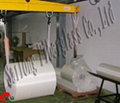| Model: | - |
|---|---|
| Brand: | - |
| Origin: | - |
| Category: | Construction & Decoration / Heat Insulation |
| Label: | glass wool , fiberglass mat , fiber felt |
| Price: |
¥9
/ pc
|
| Min. Order: | 100 pc |
| Last Online:23 Dec, 2024 |
Characteristics of Glass WOOL:
1. Heat Resistance and Specification
It can resist high temperature of , and and be cut into different thickness (3mm~) according to the requirements of customers. 700℃ 850℃ 1000℃ 100mm
2. Excellent Heat Insulation
According to physical principle, the thermal conductivity rate of gas is smaller than that of solid.? For excellent heat insulation materials, there should be many air pockets inside the materials. As an excellent heat insulation material, the glass fiber cotton has innumerable tiny air pockets, and its fibers are arranged irregularly with a thermal conductivity coefficient between 0.2~0.040 kcal/mhr℃.
3.Noncombustible Material
The main element of glass fiber is silicide (over 50%) which is noncombustible and will not deform or embrittle even under high temperature for 3 consecutive hours.
4. Good Sound Absorption When the sound wave enters the glass fiber cotton, its energy will be absorbed by the cotton due to the friction between fibers and different sizes of air pockets.? Generally speaking, the sound absorbing coefficient of the glass fiber cotton is higher than 90%. Therefore, it is a good material for preventing the interference of noise.
5. High InsulationGlass fiber is the best insulation material because it is able to resist high temperature and has good mechanical property and high chemical stability.
6.Anticorrosion Glass fiber can resist corrosion of strong acid and alkali.Its functions will not be diminished after long-term use.
7.Good Restoring Force Glass fiber contains countless air pockets, so it has excellent restoring force to resist any impact and vibration with a tensile strength over .
8.Low Moisture Absorption Rate Its moisture absorption rate is usually close to zero.
9.Lightweight and Soft Material In comparison with the other heat insulation materials, glass fiber products are the lightest and softest material.? If installed on machinery, it can help reduce the burden of weight and vibration.
10.Simple and Easy Construction It is simple and easy to use glass fiber for all kinds of thermal insulation, heat insulation, refractory and sound absorbing engineering or products.
Application:
1. Building: for roofing, flooring and wall’s thermal and acoustical insulation, guarantee the building object be the energy-saving type.
2. Ship and automobiles: replace the structure and shell body of the metal and pure plastic wooden materials, reduce the needed driving force, save energy, extend the life.
3. Heat insulation for industry equipment, parts and duct and household electrical appliances
4. Aviation and space flight: thermal and acoustic insulation for thin panel and nail-board by fire-proofing fabrics, used for the thermal insulation and sound absorption of engine system, Absorbing noises and purifies the tail gas.
5. Traffic: widely used in railway, highway, sports ground, water construction, environment-protection project, would shorten the construction period, extend the using life.
Fibreglass Mat Property
|
Thermal and Optical Properties |
Fiberglass is inorganic fiber and will not combustion |
|
Thermal Expansion Coefficient:4.8*10-6cm/cm/℃ |
|
|
Specific heat:0.19cal/g℃ |
|
|
Thermal conductivity Coefficient: 0.040w/cm.k |
|
|
Heat Resistant Temp: 700℃ |
|
|
Conversion Rate(25℃):1.55 |
|
|
Mechanical Properties |
Fiberglass has high tensile strength and good stability in length |
|
Tensile Strength:350kg/mm2 |
|
|
Elastic Modulus:7300kg/mm2 |
|
|
Horizontal Tensile Strength:35.6N/50mm |
|
|
Vertical Tensile Strength:97.2N/50mm |
|
|
Conductance |
Fibreglass have good electric insulation |
|
Permittivity:102Hz104Hz-6.32, 1010Hz-6.11 |
|
|
Loss Tangent: 102Hz-0.0042, 102Hz-0.006 |
|
|
Volume Resistivity:1010Ωcm, |
|
|
Corrosion |
Fibreglass will not absorb water, will not contribute to metal corrosion and will not decay |
|
Fiberglass Chemical Composition(Weight%) |
|||||||
|
SiO2 |
Al2O3 |
CaO |
MgO |
B2O3 |
Impurity |
||
|
R2O |
Fe2O3 |
Other |
|||||
|
54.1±0.5 |
14.6±0.4 |
16.6±0.3 |
4.6±0.3 |
8.8±0.5 |
<0.8 |
<0.5 |
Allowance |
Fiberglass Thermal Conductivity:
|
Temperature(℃) |
25° |
100° |
200° |
300° |
400° |
500° |
600° |
700° |
|
Thermal Conductivity (kcal/mhr℃) |
0.030 |
0.037 |
0.048 |
0.058 |
0.076 |
0.094 |
0.112 |
0.16 |
Fibreglass Absorption and Vibration Property:
|
(Hz) |
125 |
250 |
500 |
1000 |
2000 |
4000 |
|
0.32 |
0.76 |
0.94 |
0.96 |
0.95 |
0.98 |
Product Specification:
|
Thickness |
Density(kg/M3) |
Weight(kg/ roll) |
Length(M) |
|
3MM |
130 |
12-20 |
40 |
|
4MM |
130 |
16-27 |
40 |
|
5MM |
130 |
18-24 |
30 |
|
6MM |
140 |
22-31 |
30 |
|
8MM |
140 |
20-30 |
20 |
|
10MM |
140 |
24-36 |
20 |
|
12MM |
150 |
32-43 |
20 |
|
15MM |
160 |
30-40 |
15 |
|
20MM |
180 |
32-40 |
10 |
|
25MM |
180 |
40-50 |
10 |
|
|||











